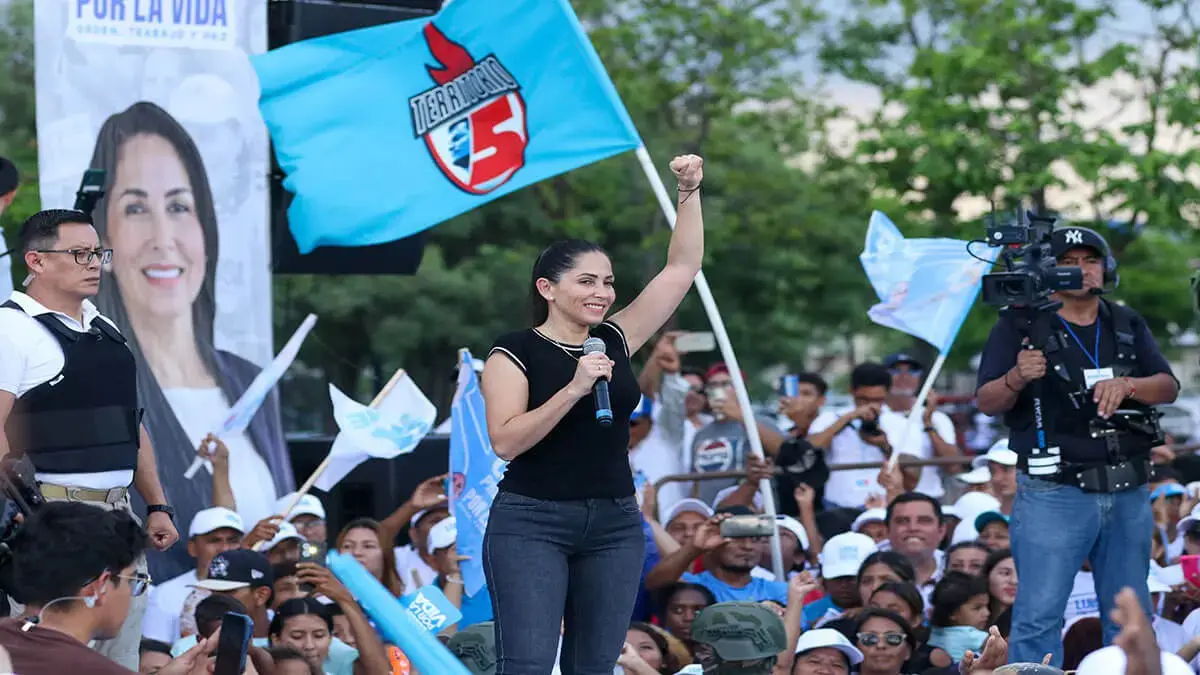Ecuadorians To Elect Their President on Sunday

Presidential candidate Luisa Gonzalez closes her campaign with fishermen in Santa Elena. X/ @ZoomEcuador
February 6, 2025 Hour: 9:38 am
Luisa Gonzalez and Daniel Noboa are the candidates most likely to win or advance to the second round.
On Sunday, millions of Ecuadorians will head to the polls to elect new members of the National Assembly and the country’s next president.
RELATED:
Ecuadorian Tariffs on Mexican Products Have Minimal Impact: Sheinbaum
According to most voter intention surveys, two presidential candidates have the highest chances of winning or advancing to a runoff: Luisa Gonzalez, the candidate of the Citizen Revolution, and Daniel Noboa, Ecuador’s current president, who is seeking re-election. Below are key points to understand the context of the upcoming general elections in this Andean nation.
1. Elections Under the State of Internal Armed Conflict
These will be the first elections held under the state of “internal armed conflict,” declared by Noboa at the beginning of 2024 to combat criminal gangs. Groups linked to international drug trafficking are considered the main culprits behind the wave of violence affecting this Andean nation, which recorded the highest homicide rate in Latin America in 2023.
2. Noboa Under Scrutiny
These elections will also serve as a sort of referendum on Noboa’s short tenure. He took office in November 2023 to complete the 2021-2025 term after the early departure of Guillermo Lasso. His administration has been marked by strong political actions, most notably the controversial raid on the Mexican Embassy in Quito to arrest former Vice President Jorge Glas.
3. IMF-Backed Reforms at Stake
The election results will also determine the fate of the unpopular economic reforms implemented by the Noboa administration to access external credit and meet the conditions set by the International Monetary Fund (IMF). Among these measures are an increase in the value-added tax (VAT) from 12% to 15% and a reduction in subsidies for the most widely consumed gasoline types.
4. Only Two Women on a Ballot with 16 Candidates
Voters will face a crowded ballot with sixteen presidential candidates, most of whom are largely unknown to the general public. Only two of them are women: Luisa Gonzalez and Andrea Gonzalez, who was the vice-presidential candidate in the previous election alongside the assassinated candidate Fernando Villavicencio.
5. Correism vs. Anti-Correism
Ecuador’s political landscape is shaped by the rivalry between two major political tendencies: “Correism,” a progressive movement with deep popular support named after former President Rafael Correa, and “Anti-Correism,” representing the right-wing forces that Noboa has successfully rallied to his side.
6. A President-Candidate
While Noboa is allowed to seek re-election, the law requires the president to take a leave of absence and step away from office for the entire electoral campaign. However, he has only partially complied with this rule, stepping away from the presidency only on days when he had campaign activities. Some days, he has worn the jersey of his party, National Democratic Action (ADN), while on others, he has donned the presidential suit.
7. Two Vice Presidents at the Same Time
During the campaign, Noboa was legally required to temporarily delegate the presidency to Vice President Veronica Abad. However, due to political disputes with her, he did not comply with this mandate. Instead, he appointed Public Administration Secretary Cynthia Gellibert as “acting vice president” via executive decree, delegating the presidency’s responsibilities to her on campaign days. The Constitutional Court ruled this unconstitutional, affirming that Abad was the only authority legally capable of replacing Noboa.
8. The Disqualification of Topic
One of the first controversies in this election was the disqualification of former legionnaire and security entrepreneur Jan Topic, who was seen as a strong competitor capable of drawing votes away from Noboa. His candidacy was challenged due to his alleged contracts with the state. The Electoral Dispute Tribunal (TCE) removed him from the race based on “confidential reports” from the tax administration.
9. A Constituent Assembly on the Horizon?
Since taking office, Noboa has pushed for multiple reforms to the 2008 Constitution, which laid the foundation for Correa’s presidency. In an interview at the end of 2024, he emphasized the need for further constitutional changes and even hinted at the possibility of convening a Constituent Assembly.
10. Dollarization Is Not Up for Debate
The one issue with near-universal consensus is dollarization. Presidential candidates have expressed their commitment to maintaining the U.S. dollar as Ecuador’s sole legal currency. This policy has been in place since 2000.
teleSUR/ JF Source: EFE






